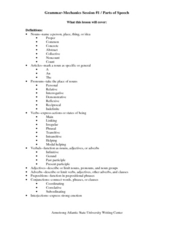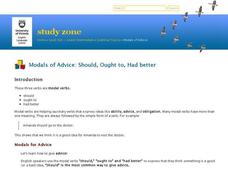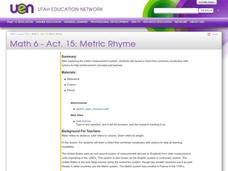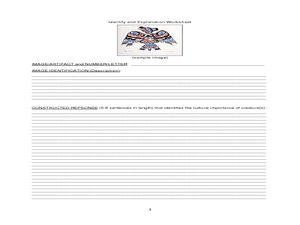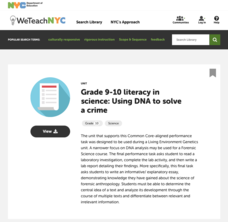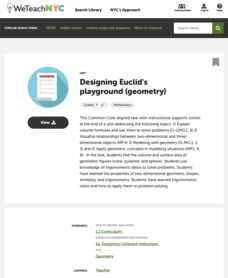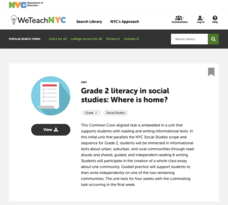Curated OER
Idioms in Everyday Language
Students describe idioms and their use in everyday language. They describe the difference between literal and idiomatic meanings. In groups, students use iPhoto to create books that explain and illustrate a variety of idioms describing...
Curated OER
May or Might
For this grammar worksheet, students choose the appropriate verb, may or might, to complete ten sentences grammatically correct.
Curated OER
Grammar-Mechanics Session #1/Parts of Speech
As part of a grammar lesson, use these sentences to identify parts of speech. There are no directions, but parts of speech are available. The resource contains ten sentences in all.
New York City Department of Education
Peter’s Garden
Watch scholars' understanding of fractions bloom. The resource presents a performance task where the fractions are equal parts from the same whole, and mathematicians must use them to solve problems about a grade level garden. Teachers...
Curated OER
Drugs
Students participate in various activities dealing with prescription drug bottle vocabulary and modals. They discuss legal and illegal drugs, complete a vocabulary worksheet, and write sentences using the correct form of modals.
Curated OER
Listening for Meaning: Same Sound
Students listen to a taped conversation to help them learn the meaning of the contraction "d" with the words "had" and "would".
New York City Department of Education
Grade 11 Literacy in Social Studies: Research Paper
The lesson guides young academics through the steps in producing a 10-page research paper on any topic in American history. Historians begin by formulating a thesis and gathering resources, then move on to creating an outline, and end...
Curated OER
Should, Ought to, Had better
In this advice learning exercise, students fill in the blanks to sentences with the words should, ought to, or had better. Students complete 8 sentences total.
Curated OER
Metric Rhyme
Students identify various units of measurement. In this measurement lesson, students learn several chants that combine metric vocabulary words and actions to reinforce the concepts learned.
Curated OER
African American Experiences: Window to the Past
Learners examine African life during slavery on the Internet. In this slavery lesson, students use the Internet to research slavery and create a scrapbook. Learners review pictures of slavery and label them as primary or secondary sources.
Curated OER
Stories Behind Pacific Northwest First Nations' Images
Students investigate Canadian culture by examining mascots of the 2010 Olympics. In this Canadian history lesson, students read a Vancouver Olympics guide to identify three Canadian mascots and their importance to the First Nations...
Curated OER
Global Music Lesson Plans: Britten and Japan – Japan and the UK
Students explore the links between Japanese and British culture. In this Japanese music lesson, students listen to their instructor present a lecture regarding Gagaku music and then perform "Te Lucis Ante Terminum" with Japanese...
Curated OER
Uncle Sam Wants You!
High schoolers examine several narratives exploring attitudes to World War II involvement at the time. They develop their own opinions and write a fictional personal narrative to record their observations.
Curated OER
Media Literacy: Discovering and Understanding Propaganda
Ninth graders study different types of propaganda and select an issue that is significant to them. In this exploratory lesson students design and create posters on the topic of their choice and write a narrative describing it.
Curated OER
How Worldly Are You?
Sixth graders locate and map six components to have a working knowledge of maps. In this map skills lesson, 6th graders define the six map components and work in groups to draw a map using the components. Students read a related story...
Curated OER
Developing Grammar
Students work on grammar with annual events and past tenses respectively. They drill and practice independently and in small groups. Students' extend their linguistic precision when talking about their lives.
Curated OER
Parts of Speech
In this parts of speech worksheet, students read about the different parts of speech including past, present, future, singular, plural, and more. Students complete a quiz on the parts of speech where they answer 10 multiple choice...
Curated OER
Novel Analysis
Students read the novel, Lord of the Flies, then write an essay analyzing the novel. They analyze, in small groups, characters, plot, setting, style, symbolism, theme, critical responses, and historical influences
Curated OER
GI's, Gals & Gardens
Students, in groups, design a war participation campaign for a specific audience during WWII. They design posters and prepare an oral presentation for the class.
New York City Department of Education
Grade 9-10 Literacy in Science: Using DNA to Solve a Crime
Scholars become detectives and use science to solve a crime! A complete unit introduces DNA and includes hands-on activities that have learners model DNA and extract it from different food types. A culminating activity challenges...
New York City Department of Education
Designing Euclid’s Playground
Create a geometric playground. Pupils work through a performance task to demonstrate their ability to use geometric concepts to solve everyday problems. The accompanying engineering design lessons show teachers how the assessment works...
New York City Department of Education
Grade 2 Literacy in Social Studies: Where Is Home?
What makes a community? How communities differ? Young scholars research different types of communities, small rural towns, and large crowded cities. They respond to writing prompts, and write essays in groups to understand the wide...
Curated OER
Social Problems
An adult ESL class brainstorm what they believe to be the major problems in Namibia. In groups, they use the list of problems and put them into the order of the most critical and the reasons why. They research possible solutions and...
Curated OER
What's Wrong - Intensive Reading
Students discuss the different types of reading and when to use each type. They read passages and try to find the mistake in each sentence.




